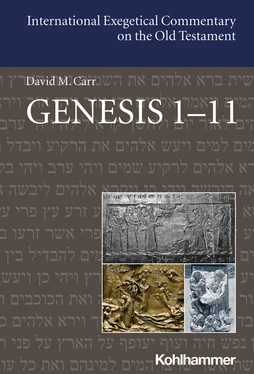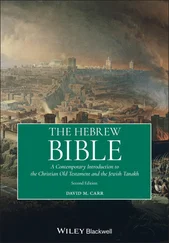David M. Carr - Genesis 1-11
Здесь есть возможность читать онлайн «David M. Carr - Genesis 1-11» — ознакомительный отрывок электронной книги совершенно бесплатно, а после прочтения отрывка купить полную версию. В некоторых случаях можно слушать аудио, скачать через торрент в формате fb2 и присутствует краткое содержание. Жанр: unrecognised, на английском языке. Описание произведения, (предисловие) а так же отзывы посетителей доступны на портале библиотеки ЛибКат.
- Название:Genesis 1-11
- Автор:
- Жанр:
- Год:неизвестен
- ISBN:нет данных
- Рейтинг книги:4 / 5. Голосов: 1
-
Избранное:Добавить в избранное
- Отзывы:
-
Ваша оценка:
- 80
- 1
- 2
- 3
- 4
- 5
Genesis 1-11: краткое содержание, описание и аннотация
Предлагаем к чтению аннотацию, описание, краткое содержание или предисловие (зависит от того, что написал сам автор книги «Genesis 1-11»). Если вы не нашли необходимую информацию о книге — напишите в комментариях, мы постараемся отыскать её.
Genesis 1-11 — читать онлайн ознакомительный отрывок
Ниже представлен текст книги, разбитый по страницам. Система сохранения места последней прочитанной страницы, позволяет с удобством читать онлайн бесплатно книгу «Genesis 1-11», без необходимости каждый раз заново искать на чём Вы остановились. Поставьте закладку, и сможете в любой момент перейти на страницу, на которой закончили чтение.
Интервал:
Закладка:
11 b“and” is the reading in numerous textual witnesses (e.g., SP, LXX, Syriac, Targum Jonathan, Vulgate), while the MT lacks the conjunction. Though the majority reading could be understood to be a harmonization with 1:12, it conforms better with Hebrew usage, where an asyndetic list of three items would be unusual.
11 cAs noted in Edward J. Young, “The Days of Genesis: Second Article,” WTJ 25 [1962/63]: 143–71 [here 158, note 96], the expression מין (translated here and throughout Gen 1 as “kind”) means mainly that the producer will produce something “essentially the same as itself,” and is thus not precisely identical to the modern concept of “species.”
14 aReading לשנים (“and for years”) with 4QGen k, Old Greek, and Samaritan Pentateuch versus שנים in Syriac and the MT. Alternatively, it is quite possible, especially in this last position in the sequence, that the preposition ל (“for”) serves double duty to characterize “for days and years.” Either way, the semantic content is the same.
20 aThe LXX includes another “and it was so” at the end of 1:20, matching the report of making sea and air creatures to other creation acts in Gen 1. For more discussion of this and similar ways that the LXX presents a more uniform version of the creation process, see below.
22 aStanding within a blessing, the imperative form functions as a modal wish, not a prediction, hence the translation “may you be fruitful” rather than “be fruitful….” The modal force of this blessing (and, by analogy, the similar blessing in 1:28) is further indicated by the marked jussive wish relating to birds in the latter part of the verse: והעוף ירב בארץ (“may the birds multiply on the earth”). For discussion of the modal use of the imperative in such blessings see the translation note below on Gen 1:28 (28 a).
26 aThis translation, like most, renders אדם as a collective term for humanity, but cf. James Barr, “One Man or All Humanity?” in Recycling Biblical Figures , ed. Athalya Brenner and Jan Willem van Henten (Leiden: Deo Publishing, 1999), 3–21, who argues that such an inclusive use of אדם is poorly attested and that the term refers here, as in Gen 2–3, to an individual male figure. This rendering, however, becomes difficult to sustain when the text goes on in 1:26 to have this figure made in the images (plural) of the speaker, use the plural וירדו to refer to this figure’s future rule over creatures, and (in 1:27b) describe the creation of both male and female. Indeed, in contrast to the usage in Gen 2–3, there is no broader context in Gen 1 in which a reference to an individual, “the human,” would make sense. All of the rest of Gen 1 describes God’s creation of types of living creatures, and it is natural to understand God’s creation of אדמה here in similar terms. That said, see below in the diachronic discussion of the relation of Gen 2–3 to Gen 1 for one possible explanation for the choice of האדם to refer to collective “humankind” in this context.
26 bAs argued in Walter Gross, “Die Gottebenbildlichkeit des Menschen im Kontext der Priesterschrift,” TQ 161 (1981): 21–22; idem. “Die Gottebenbildlichkeit des Menschen nach Gen 1,26.27 in der Diskussion des letzten Jahrzehnts,” BN 68 (1993): 36–37; Garr, In His Own Image and Likeness , 168–69; and Schellenberg, Der Mensch, das Bild Gottes? 76, 114–15 (among others), both literary context and Near Eastern parallels suggest that the preposition ב here is not a bet normae focused on similarity of humans to God (e.g., “in the image of God”) but a bet essentiae (“as the image of God”) that is focused on the human role as divine representatives on earth. Nevertheless, one should be careful here not to develop a false either/or, where a primary focus on human status “as” images of God excludes the idea that this status is embodied by some human similarity to a God that is conceived along anthropomorphic lines. See the commentary below for more discussion.
26 cThe sequence of cohortative followed by a jussive expresses purpose, “so that.” 4
26 dThe reading translated here, “all the earth” (בכל־הארץ) is reflected in all the major early witnesses, while the Syriac has “all the wild animals of the earth” conforming 1:26 to lists in 1:24 and 25. This latter reading could be supported by the fact that having “all the earth” as the reading here gives a premature conclusion to what the humans are to rule, since this expression is followed by “and all the creeping animals that creep on the earth.” Nevertheless, “all the wild animals of the earth” is a late attested reading and may be an assimilation to lists found in 1:24 and 25, as may be the mention of “creeping animals that creep on the earth” that follows it (in all witnesses). 5Either the Syriac preserves an earlier reading than a corrupted version in all the witnesses, or the earlier witnesses preserve a slightly harmonized reading (where “creeping animals that creep on the earth” was added by an early scribe after “and the earth” to conform 1:26b to the “all the creeping animals on the earth” in 1:28) that was later harmonized in the Vorlage to the Syriac to more fully correspond to 1:24–25.
28 aThe blessing here, as in 1:22, is formulated in Hebrew with an imperative form. This corresponds to the rule, wherein the contents of blessings, insofar as they are formulated in verbal form, are expressed with modal verb forms. Since ancient Hebrew uses a supplitive system (first person cohortative, second person imperative, third person jussive [short form of the prefix conjugation]), the second person blessing here is formulated with the imperative form. There is, therefore, no implication of a command to multiply or rule the earth in the imperative forms of v. 28. Instead, there is the promise of powers/capabilities. 6
29 aThe expression הנה translated here as “Look!” and in 1:31 as “indeed” is a interjecting deictic particle calling attention to what follows. Older translations render it with the now archaic “Behold.” Contemporary English lacks an exact equivalent to הנה. Therefore, the context leads to different renderings in this commentary of this particle that is difficult to precisely translate into English or German.
29 bThe MT and SP have פרי עץ (“tree fruits”) here possibly anticipating this expression in Gen 3:2, while this is missing from the OG, which only has an equivalent to פרי (“fruit”).
29 cEmphasis is added in the translation here to reflect the front-extra position of this prepositional phrase in the Hebrew clause.
31 aSee note 29 aon הנה in 1:29.
31 bThe addition of the definite article to day six is another marker that the entire day label system beginning in 1:5, but only featuring days without definite articles up to this point, is aimed to mark off the six days prior to Sabbath. The day-label system is Sabbath-oriented.
2:1 aThe Hebrew word here, צבא, means “army,” whether heavenly or earthly. In many translations it is commonly rendered with the archaic English word for army “host.” For more discussion of this difficult expression see the commentary below.
2:2 aThis translation follows the proposal in Cassuto, Genesis Pt. 1 , 61–62 that the formation in Gen 2:2 follows a pattern seen elsewhere (e.g., Gen 17:22; 24:19; 49:33; Exod 40:33b–34) where an initial clause with the verb כלה (“finish”) places the event of the second clause after the completion of a given act. 7
2:2 bThe SP, LXX, and Peshitta (also Jubilees 2:16) read (the equivalent of) השישי “sixth” here, a reading that avoids the implication that God was still working on the seventh day. Some argue that the difficult MT (and Targum) reading השביעי (“seventh”) in this locus is the accidental product of scribal assimilation of 2:2a to the description of God’s rest on the seventh day (e.g., Ronald S. Hendel, Genesis 1–11 , 33; Krüger, “Schöpfung und Sabbat,” 166). Though this latter process is possible, I opt for the difficult MT and Targum reading of “seventh,” since a reading of “sixth” here would represent a step back in the narrative into the sixth day, which is concluded in 1:31 and reflected back on in 2:1. For more discussion see the commentary below.
Читать дальшеИнтервал:
Закладка:
Похожие книги на «Genesis 1-11»
Представляем Вашему вниманию похожие книги на «Genesis 1-11» списком для выбора. Мы отобрали схожую по названию и смыслу литературу в надежде предоставить читателям больше вариантов отыскать новые, интересные, ещё непрочитанные произведения.
Обсуждение, отзывы о книге «Genesis 1-11» и просто собственные мнения читателей. Оставьте ваши комментарии, напишите, что Вы думаете о произведении, его смысле или главных героях. Укажите что конкретно понравилось, а что нет, и почему Вы так считаете.











